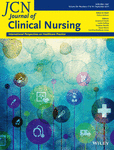
Songxian Zhao
MMed, RN, Nurse,Department of Nursing,Tianjin Medical University Cancer Institute &Hospital
Journal of Clinical Nursing , IF:1.635
Development of death education training content for adult cancer patients: A mixed methods study
Abstract
Aims and objectives: The aim of this mixed methods study was to develop science‐based content for a systematic death education training system based on the needsof adult cancer patients. The study contained two parts: survey development andDelphi survey. First, a small sample test was conducted to check the reliability and validity of the questionnaire. Next, this questionnaire was applied to investigate adult cancer patients’ needs for death education. Then, we invited experts in the fields of nursing management, clinical medicine, clinical nursing and psychological care to carry out two rounds of Delphi consultations to revise the training content.
Background: Death education is often combined with hospice care, which is based on a clear 6‐month survival period. However, the survival of adult cancer patients has improved with improved cancer diagnoses and treatments, and death education should be initiated before the dying stage. At the same time, patients’ needs for medical information become increasingly important in daily clinical practice. Therefore, a death education programme based on adult cancer patients’ needs was developed to help these patients reflect on the meanings of life and death.
Design: A mixed methods study.
Methods: During the survey development period (from April 2017–September
2017), a small sample test (n = 150) was conducted to verify the reliability and
validity of the questionnaire on death education needs of adult cancer patients. This questionnaire was developed based on a literature review and discussion among the study group. Next, 324 adults with cancer, recruited from a three‐level cancer hospital in Tianjin, China, were surveyed to analyse their needs for death education, using the questionnaire that had been tested in the pretest period. Finally, a Delphi survey was conducted from October 2017–January 2018. A panel of experts (n = 23) recruited from major hospitals, nursing schools and universities in China in the fields of clinical nursing, nursing management, clinical medicine and psychological care took part in the study to revise the training contents based on the investigation results.
Results: The reliability and validity of results based on the small sample test
revealed that the Cronbach's alpha coefficient and the half‐degree of reliability of the questionnaire were 0.924 and 0.951, respectively. This demonstrated that the questionnaire had high reliability. The KMO was 0.756 and the Bartlett Test of The work was carried out in Tianjin Medical University Cancer Institute and Hospital. Sphericity showed p < 0.001, indicating that the factor analysis was justified in the sample. Eight components with eigenvalues greater than one were retained by the factor analysis. The investigation of the patients’ needs for death education showed that the overall score of patients’ needs was 3.60 ± 0.709 points (needs were measured on a scale from 1–5, where 5 indicates high needs), and there were high demands for education regarding “cancer patient life reviews,” “death‐related ethical issues” and “to leave peacefully.” Data from expert panel members were collected in two rounds over a 4‐month period, and consensus was achieved in the second Delphi round. The final death education contents of adult cancer patients contained
four sections: cancer, death, psychology and practice. These were divided into 54 teaching topics to be included in 14 courses.
Conclusions: The adult cancer patient death education training content devised in this study is science‐based, practical and can be used as a guide for clinical nurses to provide high‐quality care to adult cancer patients.
Relevance to clinical practice: Nurses could become more involved in providing death education to adult cancer patients and their families. Further research is needed to explore the applicability of the training content and to develop the content according to changing times and patients’ needs.
Key Words: adult, death education, Delphi technique, Neoplasm


